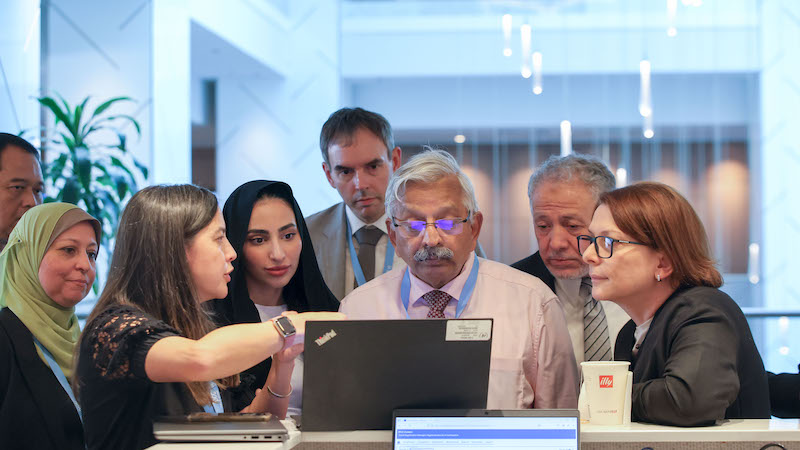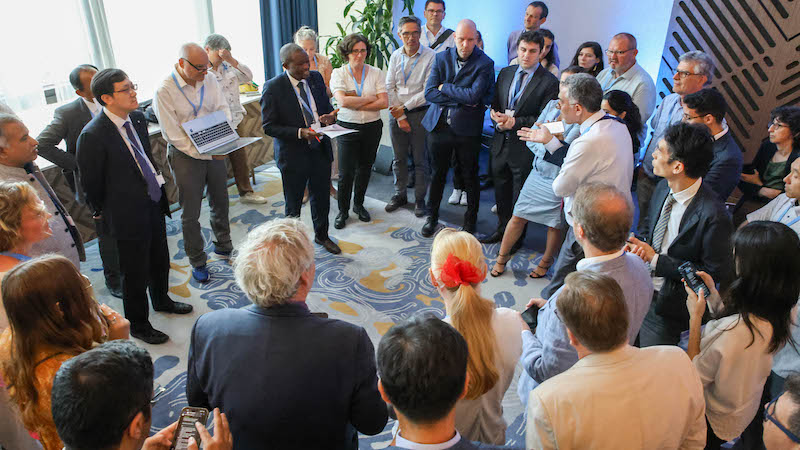Most governments want reports ready before the next global stocktake, but a dozen developing nations are opposed over inclusivity concerns
Governments have again failed to agree on a schedule for producing key climate science reports as deep divergences blocked progress at a meeting of the U.N.’s Intergovernmental Panel on Climate Change (IPCC) last week.
At the talks in Sofia, Bulgaria, most countries supported a faster process that would see three flagship reports assessing the state of climate science delivered by mid-2028, in time for the next global stocktake – the UN’s scorecard of collective climate action.
But a group of high-emitting developing countries made up of China, India, Saudi Arabia, Russia and South Africa – backed by Kenya – opposed an accelerated timeline, citing concerns that it would be harder to include scientists from the Global South, three sources present at the talks told Climate Home.
Governments were unable to reach a decision for the second time this year after “fraught talks” in January ended with the same outcome. The issue will be debated again at the next gathering in February 2025, while a separate expert meeting is tasked with drafting the outline of those reports by the end of 2024.
Fight over climate science
Adão Soares Barbosa, IPCC representative for Timor-Leste within the Least Developed Countries (LDCs) group, expressed his disappointment over the lack of agreement in Sofia resulting from “strong polarisation in the room”.
“If the assessment reports are not able to feed information into the global stocktake process, what are they good for?” he said, speaking to Climate Home.
Joyce Kimutai, who represented Kenya at the Sofia talks, said her country’s opposition to the proposed shortened timeline was “absolutely not intended to frustrate the process” but to highlight the challenges countries with more limited resources would be facing.
“With such a tight timeline, it is likely that we will produce a report that is not comprehensive, not robust. We found that very problematic,” she told Climate Home on Monday.
IPCC delegates exchange views in an informal huddle in Sofia, Bulgaria. Photo: IISD/ENB | Anastasia Rodopoulou
The primary purpose of the IPCC is to provide credible scientific assessments to the UN’s climate body (UNFCCC) and national decision-makers. The findings of its reports – which are usually compiled over several years by scientists working on a voluntary basis around the world – have been highly influential. They synthesise the latest research on climate change, as well as efforts to curb planet-heating emissions and adapt to the impacts of global warming.
The sixth series, whose final report was issued in March 2023, played a prominent role in informing the first UNFCCC global stocktake which resulted in governments agreeing for the first time to begin “transitioning away from fossil fuels” at COP28 in Dubai last December.
But some fossil fuel-rich countries like Saudi Arabia – which have pushed back against clear language on the need to cut production – have previously opposed strong recognition of IPCC reports in UNFCCC negotiations.
The UN climate body has officially requested that its scientific counterpart align its activities with the timeline of the next global stocktake. The IPCC’s input will be “invaluable” for the international review of climate action, Simon Stiell, chief of the UN climate body, told the IPCC meeting in January.
Reputation ‘at risk’
As he opened the session in Sofia, the IPCC chair Jim Skea warned of a “complex and testing” agenda.
The discussion over the report production schedule would have “far-reaching implications in terms of the timeliness of our products, and the inclusivity of both our own processes and the science that is being assessed”, he added.
Scientists and government officials were presented with a proposal drafted by the IPCC secretariat – its administrative arm – which would see the assessment reports completed between May and August 2028. That would be a few months before the global stocktake process is scheduled to end in November 2028.
The IPCC must produce its flagship report in time for the next UN global stocktake
A majority of countries, including EU member states, the UK, the US and most vulnerable developing nations, supported the proposal, stressing the importance of the scientific reports feeding into the global stocktake, according to sources and a summary of discussions by the IISD’s Earth Negotiations Bulletin. Many supporters added that the IPCC’s reputation would otherwise be at risk.
Small island states and least-developed countries argued that IPCC input is crucial for those that lack capacity to produce their own research and are most vulnerable to the immediate impacts of climate change, according to the IISD summary.
But a dozen developing countries – with India, Saudi Arabia and China being the most vocal – opposed speeding up the process, arguing that more time is needed to ensure greater inclusion of experts and research from the Global South, which would result in “robust and rigorous” scientific output.
South Africa, Russia, Kenya, Algeria, Burundi, Congo, Jordan, Libya and Venezuela expressed similar views, according to IISD.
More time for more voices
India said that “producing the best science needs time, haste leads to shoddy work”, while Saudi Arabia claimed that the shortened timeline would “lead to incomplete science and would be a disservice to the world”, according to the IISD summary of the discussions.
Kenya’s Kimutai told Climate Home that producing scientific literature and reviewing submissions takes a lot of time and, unlike their counterparts in richer countries, scientists in the Global South can rarely count on the help of junior researchers at well-funded institutions.
“We love this process – we find it important,” she added, “but we’re trying to say that, while it may be an easy process in other regions,
Read More


